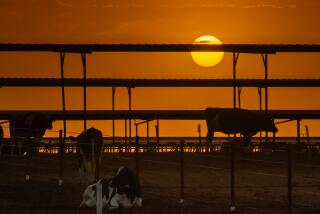Mad Cow Safeguards Are Highly Effective
Re “Beef Up Livestock Rules,” editorial, Dec. 28: Prior to the announcement that a single cow in Washington state had tested positive for bovine spongiform encephalopathy, the California Cattlemen’s Assn., representing California’s $1.35-billion beef cattle industry in legislative and regulatory affairs, supported both a prohibition on the slaughter of downer cattle for food and increased surveillance for BSE. Nevertheless, strong evidence indicating that this single animal is of Canadian origin and the fact that at-risk materials did not enter the food supply demonstrate that the current safeguards against the introduction and spread of BSE in the U.S., despite any flaws, remain highly effective.
Benjamin L. Higgins
Executive Vice President
California Cattlemen’s Assn.
Sacramento
*
As more and more evidence points to the mad cow being Canadian, the need for country-of-origin labeling of beef becomes clearer. U.S. consumers have the right to know they are purchasing U.S.-grown beef, not beef from some foreign source. U.S. producers are willing to put their names on their products. This would be a simple, inexpensive step to ensure the quality of our beef supply.
Michael Falotico
Claremont






